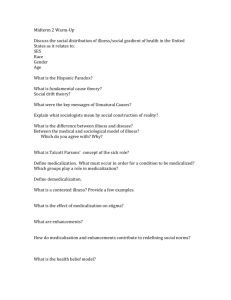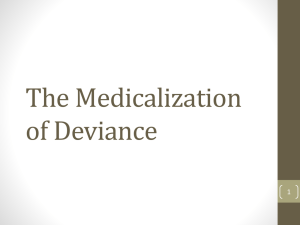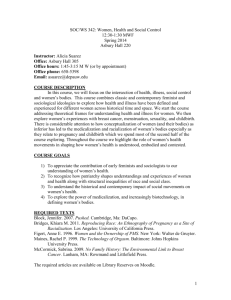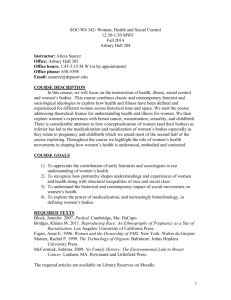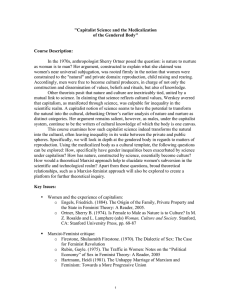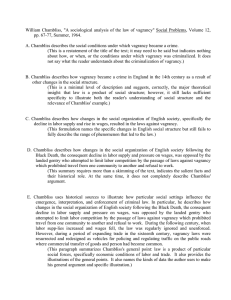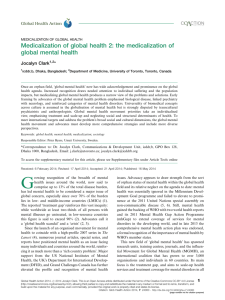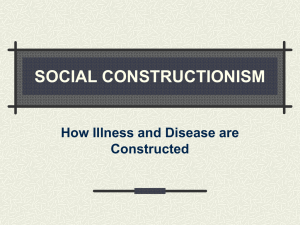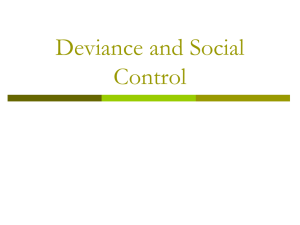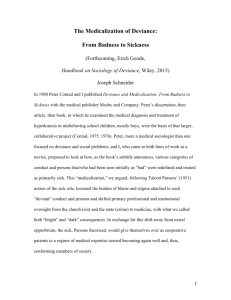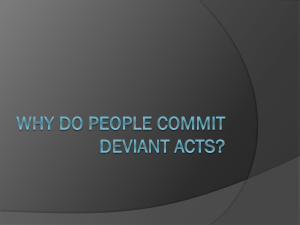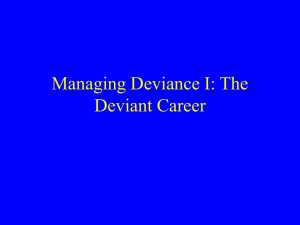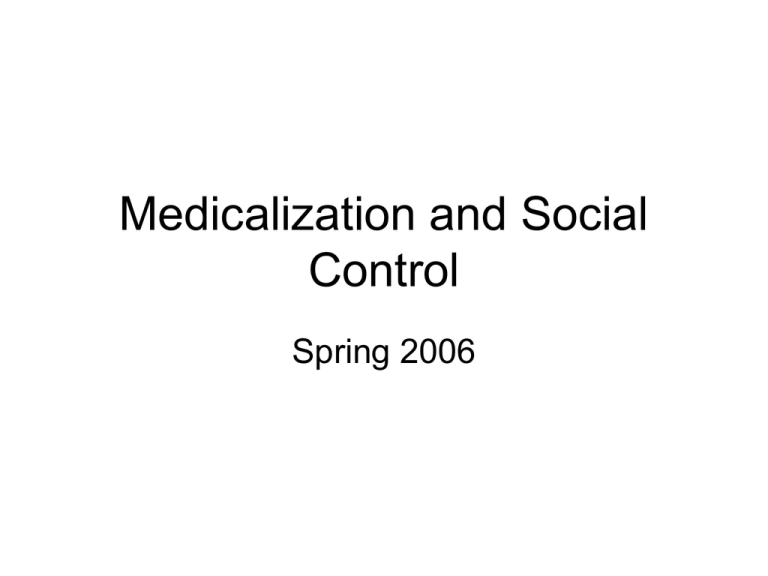
Medicalization and Social
Control
Spring 2006
Consider the career…
…of one of the seven deadly sins
The Seven Deadly Sins
•
•
•
•
•
•
•
Pride
Envy
Gluttony
Lust
Anger
Greed
Sloth
Gluttony
How do we get from badness to
illness with a stop along the way
at self-righteousness, respect,
and acceptance?
Medicalization
(and de-medicalization)
as Social Control
Styles of Social Control
• Penal
• Compensatory
• Conciliatory
• Therapeutic
• Reform
• Prevention
Examples Abound
social anxiety mood swings
impotence concentration shyness
body size breast size/shape
aging over-eating under-eating
gambling infertility PMS
homelessness childlessness
childhood aging teeth, vision
childbirth menopause violence
spousal abuse child abuse
pedophilia male chauvinism
alcoholism drug addiction
intelligence
A (Relatively) Innocuous Example
Fertility
What are some characteristics of
"normal" fertility?
•
•
•
•
•
•
Age
Marital Status
Relationship Type
Time since marriage
Number
Method
How have different cultures at
different times responded to
deviant fertility?
• Rites and rituals
• Gossip, reputation, feelings of emptiness
(maybe biological, maybe cultural, maybe both)
• Forced marriage
• Banishment/ostracism/divorce
• Death
Contemporary Progress
Defining infertility as a medical problem has
many advantages…
• Move it irrational to rational
• Reduced blaming the woman
• Produced real solutions in many cases
Definitions
• “process by which non-medical problem become defined and treated
as medical problems, usually in terms of illnesses or disorders”
(Conrad 1992, 209)
• “process and outcome of human problems entering the jurisdiction of
medical profession” (210)
• "process whereby more and more of everyday life has come under
medical dominion, influence, and supervision" (Zola 1983 quoted by
Conrad 1992, 210)
• "defining behavior as a medical problem or illness and mandating or
licensing the medical profession to provide some type of treatment for
it" (Conrad 1975 quoted by Conrad 1992, 210)
• "occurs when a medical frame or definition has been applied to
understand or manage a problem" (Conrad 1992, 211)
The Case of Hyperkinesis
Moral Entrepreneurs and ClaimsMakers
Medicalization IS about definitions.
Three Levels
• Conceptual – How do we think about a
behavior?
• Institutional – How do we, societally,
handle the behavior?
• Interactional – How do we use medical
frame for interacting with one another
around the behavior?
Bias/Orientation of Research
• Mostly critical of "over-medicalization"
• Classic studies document historical
evolution including how medicine
"discovered" the problem
• Focus on actors involved lobbying for and
against changes in definitions
• Big emphasis on social construction.
Social Construction
• Idea or practice has a history
• Is contingent not natural or inevitable
• Generally result of power struggles
• Often serves one or another interest
BUT
• Can’t just dismiss it as “mere construction”
• Does not falsify the practice
Macro-Sociological Processes
•
•
•
•
Secularization – decline in religion
Faith in science, rationality, progress
Organizational power of medical profession
Corporatization of medicine (pharmaceuticals,
device manufacturers, service providers,
insurers)
• Ideology of individualized solutions vs. structural
fixes
• Ideology of technical fixes vs. structural fixes
• Progress, humanization
Ambivalence Abounds
• Not all religions oppose medicalization
• “Medical imperialism” vs. Intraprofessional struggles
• Development of para-professionals can
take control from doctors
• Resistance of medical profession in lethal
injection, spousal abuse
Forms of Medical Social Control
• Ideology : medical model as lens through
which behavior is seen
• Collaboration : doctors assist as part of
social control apparatus
• Technology : use of drugs, therapy,
screening as tools of social control
• Surveillance : “medical” condition makes
you subject to watching/tracking
Medicalization : Process
• Protagonists can be medical professions ,
issue crusaders (PTSD, MADD, sex
addition), patients themselves (childbirth,
PMS, homosexuality.
Moral Crusades & Claimsmaking
• Activist individuals (and, more commonly,
organizations) work to change how society
categorizes and responds to a particular
behavior
• Public awareness campaigns, attempts to
generate "social panics," and lobby for changes
in the law.
• How?
– Grounds
– Warrants
– Claims
Grounds
• Establishing grounds is an important first step.
The most common methods include
– Definitions and Domain Statements that tell us that
something exists. "Do you ______ more than twice a
week? Then you may have ________" (ADD,
depression, PTSD)
– Orientation Statements – Including redefining
problems as medical, say, or legal.
– Examples and anecdotes
– Estimating extent of problem, incidence, growth,
social costs
Warrants
• Warrants are generic bits of logic that are
provided to make it easy to take the grounds and
run with them toward the desired conclusion.
Among the most common are:
–
–
–
–
–
Blameless victims
Affiliated Evils
Deficient Policies
Historical Continuity
Rights and Freedoms
Claims
• Finally, the rhetoric of claims-making
provides conclusions – calls for action –
"what must be done" – and these are all
the stronger because activists have also
provided syllogism for how to reach these
conclusions.
Claims-Making as Organizational
Activity
• Who were the moral entrepreneurs in the hyperkinesis
case? Pharmaceutical companies, Association for
Children with Learning Disabilities, parents, teacher
organizations, schools of education, American Medical
Association, American Pyschological Association and so
on.
• IMPORTANT: This is the action of an organization.
Discussion and disagreement stops when the majority
rule (or whatever decision making system they use) in
favor of medicalization. By its size, it sets the agenda,
affects how we think. It removes the issue from a simple
“debate in the public forum of ideas.” Parents who
disregard crusading physicians or educators are called
“bad parents.”
Coming Out All Over
• Alternative Process
• “Tertiary Deviance”
• Typically involves reverse politics.
Calling the labelers pig, sexist, prude,
etc. If the former labeler persists s/he
can become the deviant.
Medicalization as DV: degrees and
range
• Medicalization as process, history
• Degree: how complete is medicalization?
– What’s it called? Is there a Latin name? An
acronym? Do we still use the other name?
• Range: how much of a behavioral area is
medicalized
Possible Historical Trajectories
How
Expansive?
How medicalized?
Problems/Critiques/Worries
•
•
•
•
The Problem of Expert Control
Medical Social Control
The Individualization of Social Problems
The De-politicization of Deviant Behavior
The Problem of Expert Control
•
Professions are organized monopolies of expertise
that are generally self regulating. Given the right by
the state to patrol themselves.
•
Moving a problem from deviance to sicknesss removes
it from the realm of public discussion. In the public
realm, norms can evolve, values can change. Once it
becomes medicalized, it is subject to a different set of
evolutionary controls. If there is a funding source
associated with it, there is a large incentive to maintain
the problem and discover more and more of it.
Medical Social Control
•
•
•
Through medicalization society is able to
“reach into” persons in a way that the
state alone could not.
Cf. medicine in Soviet Union.
Demedicalization can be very difficult
The Individualization of Social
Problems
•Cf. Mills 1943. Ryan 1971. Individualization rules out
structural solutions.
– Removes possibility of behavior being a manifiestation of a group
saying “we’re not going to take it any more.”
•
Uppity slaves. Unruly students. Outside agitators.
– Ignores possibility that behavior may be a response to a social
situation. By rushing to quench any individual deviance we rob
society of one of the important functions of deviance, acting as a
warning signal.
– Consider also the phenomenal increase in the number of
“medicalized” aspects of children that have been added to our
educational system over the last 30 years and how much the
quality has declined over the same period. By always being able to
diagnose the individual, fundamental changes in the system are
never considered.
De-politicization of Deviant
Behavior
•
Cf. children and violence. Something
wrong with children or something wrong
with the world they live in?
Ponderables
• Are there examples of medicine
undermining power?
• Why so much medicalization around
women’s behavior?

